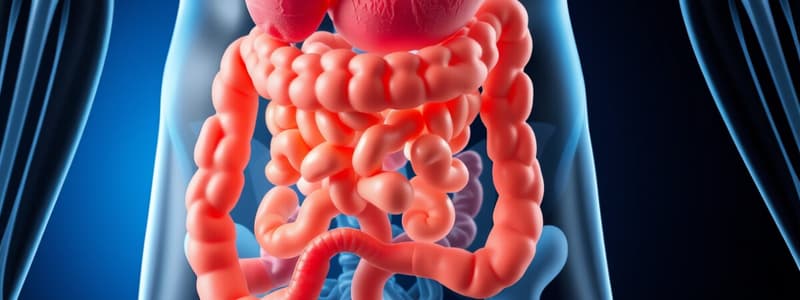Podcast
Questions and Answers
Which organ is NOT involved in excretion?
Which organ is NOT involved in excretion?
- Heart (correct)
- Skin
- Kidney
- Lungs
The main role of the skin in excretion is to remove carbon dioxide.
The main role of the skin in excretion is to remove carbon dioxide.
False (B)
What is the main organ of excretion and homeostasis in the human body?
What is the main organ of excretion and homeostasis in the human body?
Kidney
The _____ narrows to a thin tube called the ureter.
The _____ narrows to a thin tube called the ureter.
What happens when bodily fluids are too concentrated due to sweating and insufficient water intake?
What happens when bodily fluids are too concentrated due to sweating and insufficient water intake?
Match the following kidney parts with their descriptions:
Match the following kidney parts with their descriptions:
The adrenal gland is located at the bottom of each kidney.
The adrenal gland is located at the bottom of each kidney.
What blood vessel supplies blood to the kidney?
What blood vessel supplies blood to the kidney?
What is ultrafiltration in the context of nephron function?
What is ultrafiltration in the context of nephron function?
The proximal convoluted tubule reabsorbs all useful substances from the glomerular filtrate.
The proximal convoluted tubule reabsorbs all useful substances from the glomerular filtrate.
What hormone influences water balance in the collecting duct?
What hormone influences water balance in the collecting duct?
Blood containing impurities, such as _____, enters the kidneys through the renal artery.
Blood containing impurities, such as _____, enters the kidneys through the renal artery.
Match the following structures with their functions in nephron function:
Match the following structures with their functions in nephron function:
What is the composition of glomerular filtrate?
What is the composition of glomerular filtrate?
The walls of the Bowman's capsule are two cells thick to facilitate ultrafiltration.
The walls of the Bowman's capsule are two cells thick to facilitate ultrafiltration.
Flashcards are hidden until you start studying
Study Notes
Excretion in the Human Body
- Excretion removes waste products of metabolism from the body.
- Three organs involved in excretion:
- Skin: Excretes water, salt, and urea in sweat; regulates temperature.
- Lungs: Excrete carbon dioxide and water.
- Urinary System: Main organ of excretion and homeostasis; excretes water and urea.
Kidney Structure and Function
- Kidneys are located on either side of the spine, below the diaphragm in the upper abdominal cavity.
- Composed of three layers:
- Medulla: Middle layer.
- Cortex: Outer layer.
- Pelvis: Inner layer that narrows into the ureter.
- Ureters transport urine from kidneys to the bladder; urine is expelled through the urethra.
- Adrenal glands sit atop each kidney.
- Blood flow: Renal artery from the aorta brings blood, and filtered blood leaves via the renal vein into the inferior vena cava.
Body Fluid Concentration Regulation
- Excess water intake leads to diluted bodily fluids, resulting in pale, weak urine (diuresis).
- Low water intake or high salt consumption causes concentrated bodily fluids, leading to dark, strong urine and increased thirst.
Nephron Structure and Urine Formation
- Nephrons are the functional units of the kidney responsible for urine production.
- Blood with impurities enters kidneys through the renal artery.
- High pressure in the afferent arterioles facilitates ultrafiltration in the glomerulus.
- Glomerular filtrate consists of water, glucose, amino acids, vitamins, and salts, but excludes proteins and blood cells due to their size.
Reabsorption Process
- Useful substances are reabsorbed in the proximal convoluted tubule:
- Water absorbed by osmosis.
- Other substances absorbed by diffusion and active transport.
- Proximal convoluted tube cells contain many mitochondria for energy-intensive active transport.
- Additional water reabsorption occurs in the loop of Henle and distal convoluted tubule.
Final Steps in Urine Formation
- Collecting duct fine-tunes water balance, influenced by anti-diuretic hormone (ADH) from the pituitary gland.
- Urine travels to kidney pelvis and then to the bladder for storage.
Studying That Suits You
Use AI to generate personalized quizzes and flashcards to suit your learning preferences.




